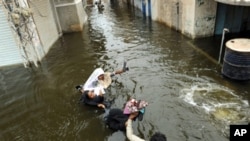The International Monetary Fund (IMF) has announced it will increase its funding for flood-hit Pakistan just as the United Nations warns that international relief aid is lagging significantly. The IMF says it will give Pakistan $450 million in emergency flood aid later this month. The move follows similar increases by the Red Cross and World Bank. U.N. officials are urging the international community to speed up assistance to Pakistan, where flood victims are beginning to show frustration and resentment at the slow pace of aid.
As anger and frustration among the flood victims intensify, reports that international aid has slackened raises concerns. Experts say the situation is a defining moment for Pakistan.
"It may force the Pakistani government to actually introduce a taxation policy which could mean that more than one percent Pakistanis pay taxes. I think that you could see some good coming out of this. But it could also be a negative and it is too early to tell, frankly," said Stephen Cohen, a senior South Asia analyst at the Brookings Institution.
Cohen blames the magnitude of Pakistan's flood damage partly on decades of environmental neglect and deforestation. He says the country's uncertain future is why neighboring India has been slow to respond.
"[The Indians] are trying to figure out what the outcome will be. They can't figure out whether this may give a rise to an Islamist government in Pakistan [or] whether it is going to lead to the military coming back to power. Again I think that is unlikely. Whether the civilian government will reform and gain coherence, which is happening slowly, but very slowly," added Cohen.
Pakistan's Retired Army Chief Jehangir Karamat says his real concern is the country's worsening economy and rising food prices.
"Food inflation is going to be higher, which coupled with the anger on the street and the difficulties that the people are facing could translate into social unrest," said Karamat.
Key to Pakistan's recovery, says Timothy Lenderking at the U.S. State Department, is convincing the international community of the urgency of the crisis, and the Pakistani government demonstrating greater credibility and transparency.
"That all this money that the international community is pledging is going to be used effectively, used in the right way. Pakistanis themselves have a lot of doubts about the way the aid money is being used," noted Timothy Lenderking who heads the Pakistan office at the State Department.
Other analysts say Pakistan's future depends on President Asif Ali Zardari's government reacting coherently, the Army continuing its support of civilian rule and the international community providing sufficient aid.




